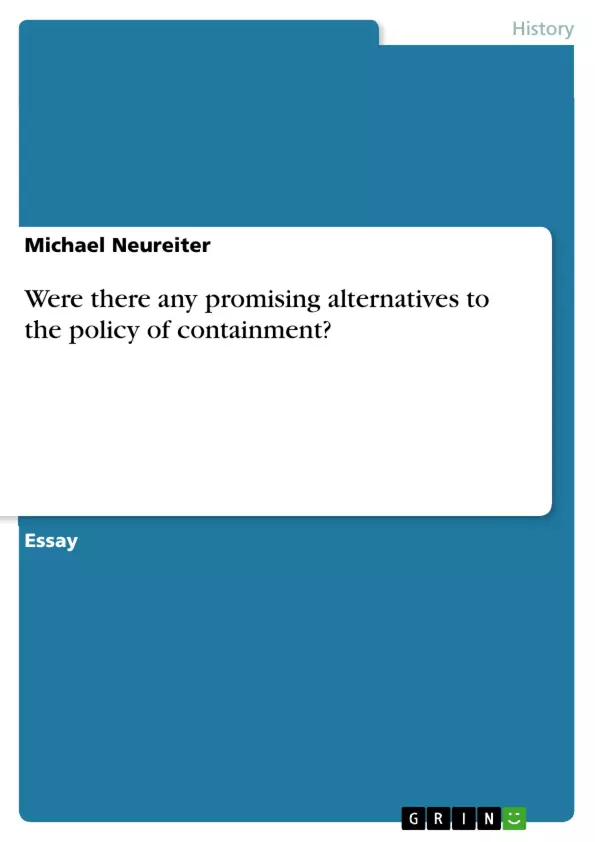In 1947, when U.S. President Harry S. Truman and his key foreign policy aides finally became aware of the threat posed by Soviet expansionism, they decided to stall the spread of communism and to halt Stalin’s aggressive ambitions. Their strategy became known as the “policy of containment”, which was first outlined by President Truman in his 1947 “Truman Doctrine”, stating that Soviet expansionism poses a serious threat to the freedom of peoples all over the world. Therefore, it must be the goal of the United States to prevent the Soviet sphere of influence from expanding, but also to prevent a third world war by not intervening in the already existing Soviet sphere of influence. But not everyone in America was happy with this way of dealing with the Soviet threat. Different actors opposed the policy of containment for different reasons and came up with their own, alternative ways of how to deal with the worldwide spread of communism. Main critics of the containment policy included parts of the Republican Party, various isolationists and famous journalist Walter Lippmann. In this essay, I will uphold the view that there were no promising alternatives to the policy of containment by first rejecting these three alternatives and then showing that the policy of containment was a rather efficient and safe way to face Soviet expansionism.
Inhaltsverzeichnis (Table of Contents)
- Were there any promising alternatives to the policy of containment?
- Some Republican circles felt that Truman was going soft on communism.
- There were parts of the Republican Party which preferred another strategy in order to deal with the Soviet and communist threat.
- Another main critic of Truman's foreign policy was Walter Lippmann.
- Not only that its alternatives lacked efficiency and safety, the policy of containment itself also proved to be a rather good way to face Soviet expansionism.
Zielsetzung und Themenschwerpunkte (Objectives and Key Themes)
The main objective of this essay is to demonstrate that the policy of containment was the best possible strategy to address the threat of Soviet expansionism during the Cold War. This is achieved by analyzing and rejecting three main alternative approaches: rollback, isolationism, and the proposals of Walter Lippmann. The essay also highlights the effectiveness of containment in preventing the spread of communism and maintaining a long period of peace between the superpowers.
- The Cold War and the rise of Soviet expansionism
- The policy of containment and its critics
- Alternative strategies to containment: rollback, isolationism, and Lippmann's proposals
- The effectiveness and safety of the policy of containment
- The importance of recognizing the expertise and farsightedness of President Truman and his key foreign policy aides
Zusammenfassung der Kapitel (Chapter Summaries)
The essay begins by outlining the context of the Cold War and the threat posed by Soviet expansionism. It then delves into the policy of containment, explaining its goals and rationale. The essay proceeds to analyze and critique three main alternative strategies proposed by critics of containment, namely rollback, isolationism, and the suggestions of Walter Lippmann. Each of these alternative approaches is thoroughly examined and found to be lacking in efficiency and safety compared to containment.
The essay concludes by highlighting the effectiveness of the policy of containment. It argues that containment, while not perfect, successfully prevented the spread of communism and maintained a long period of peace between the superpowers. This analysis emphasizes the importance of recognizing the expertise and foresight of President Truman and his key foreign policy aides in adopting and implementing containment as the primary strategy to deal with the Soviet threat.
Schlüsselwörter (Keywords)
The main keywords and focus topics of this essay include Cold War, Soviet expansionism, containment, rollback, isolationism, Walter Lippmann, Truman Doctrine, international relations, superpower rivalry, and historical analysis.
Frequently Asked Questions
What was the "policy of containment"?
It was a U.S. foreign policy strategy initiated in 1947 to stall the spread of communism and halt Soviet aggressive ambitions without intervening in existing Soviet spheres of influence.
Who were the main critics of the containment policy?
The main critics included parts of the Republican Party, various isolationists, and the famous journalist Walter Lippmann.
What were the proposed alternatives to containment?
Proposed alternatives included "rollback" (actively pushing back communism) and isolationism (withdrawing from international entanglements).
Why does the essay reject the "rollback" strategy?
The essay argues that rollback lacked efficiency and safety compared to containment, which aimed to prevent a third world war.
What was the Truman Doctrine?
The 1947 Truman Doctrine stated that Soviet expansionism posed a serious threat to global freedom and established the prevention of communist expansion as a primary U.S. goal.
- Arbeit zitieren
- Michael Neureiter (Autor:in), 2010, Were there any promising alternatives to the policy of containment?, München, GRIN Verlag, https://www.grin.com/document/168936



